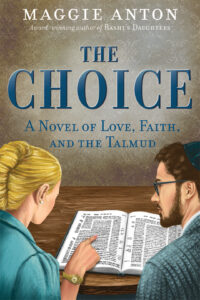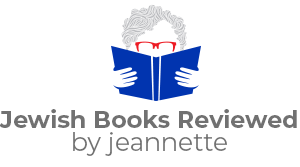By Maggie Anton
 When Chaim Potok’s book, THE CHOSEN, was published in 1967, it touched readers around the world. The story of a brilliant Chasidic boy, Danny Saunders, whose father stops speaking to him in an attempt to give a heart as large as his intellect, and the Orthodox boy Reuven Malter, who befriends him, was the first book from a major publisher to portray Orthodox Judaism in the United States.
When Chaim Potok’s book, THE CHOSEN, was published in 1967, it touched readers around the world. The story of a brilliant Chasidic boy, Danny Saunders, whose father stops speaking to him in an attempt to give a heart as large as his intellect, and the Orthodox boy Reuven Malter, who befriends him, was the first book from a major publisher to portray Orthodox Judaism in the United States.
But for Maggie Anton, author of ground-breaking books of her own (the Rashi’s Daughters series and the Rav Hisda’s Daughter series), Potok’s book was disappointing and frustrating when she reread it decades later while on a book tour.
Among other things, there were no women characters in the book. Reuven’s mother had died when he was very young. Danny’s mother, who potentially could have been a powerful rebbetzin, is hardly mentioned.Additionally, while Potok’s characters study Talmud, readers are never given any Talmud.
What if, Anton thought, you took these characters and moved them into the mid-1950s and their mid-20s? What would be happening in their lives? What would be happening in the communities around them? What would be happening in Judaism?
THE CHOICE is the result of her investigations. It is not a sequel to THE CHOSEN, but is clearly inspired by it. Nathan Mandel is a reflection of Reuven Malter and his friend Benny reflects Danny Saunders.
Characters in this book are faced with choices on all sides. Can Nathan choose to do the forbidden and teach journalist Hannah Eisin Talmud? (He does.) Can Benny, raised in a Hasidic world, make compromises for his Orthodox wife, who is not well accepted in the more restrictive Hasidic community? Why is Talmud more restrictive of women than men? Can the Talmudic admonitions of ancient rabbis be interpreted with more relevance for the 20th century.
One of the central conflicts that Nathan and Hannah have is following the rules of Niddah. (These rules require a woman who has had her period or a baby to immerse herself in a mikveh for purification purposes. A married couple is not supposed to have sex until the woman has immersed herself.)
For Nathan it is a commandment that must be followed even though it is a private ritual that no one will ever know about. For Hannah, it involves finding a sanitary mikveh that is close to home. As a reporter, she has interviewed many Orthodox women who have volunteered to her that they don’t go to the mikveh; they immerse themselves in the bathtub at home or in a swimming pool.
As a student of Talmud, Hannah asks questions and Nathan finds he doesn’t have satisfactory answers. This is a point of halachah or Jewish law where both partners have to agree on how — or if — they will follow it. It leads Nathan to the threshold of deciding whether to continue teaching at an Orthodox college or to take his father’s position as a professor at the Conservative Jewish Theological Seminary.
THE CHOICE offers a heaping measure of Talmud and theology spiked with sexy romance. Anton often says that she writes the kind of books she wants to read.
I admire her contributions to Jewish literature and the history of Jewish women. As a reader, I find her an acquired taste. I’m not drawn to romances. Her novels are an unusual blend of the lightness of romances and weighty intellectual questions.
The Author: Maggie Anton (1950 – )
Born Margaret Antonofsky in Los Angeles, Maggie Anton grew up in a secular, socialist household. She had little knowledge of Judaism until she met her husband-to-be David Parkhurst and they both discovered Judaism as adults.
In the early 1990s, she began studying Talmud in a class for women taught by Rachel Adler, now a professor at Hebrew Union College in Los Angeles.
She became intrigued with Rashi, one of the greatest Jewish scholars, who had no sons and three daughters. Legend has it that Rashi’s daughters were learned in a time when women were traditionally forbidden to study sacred texts. Anton began researching the family and the time in which they lived. From her research came the Rashi’s Daughters series: JOHEVED, MIRIAM and RACHEL.
That series was followed by RAV HISDA’S DAUGHTER, BOOK 1: APPRENTICE and its sequel, ENCHANTRESS.
Her nonfiction book, WHAT THE FIRST RABBIS HAD TO SAY ABOUT YOU-KNOW-WHAT, a light-hearted in-depth tour of sexuality within the Talmud. This book won the Gold Ben Franklin Award in the religion category.


